Cao Cao
Cáo Cāo (Chinese 曹操, pinyin Cáo Cāo, IPA (High Chinese) [ʦʰɑo̯˧˥ ʦʰɑo˥], W.-.G. Ts'ao Ts'ao, Jyutping Cou4 Cou1, grand-name (Zi) Mèngdé 孟德, IPA (High Chinese) [mʌŋ˥˩ tɤ˧˥], * 155; † 15 March 220 in Luoyang) was a Chinese general, strategist, politician, poet, and warlord during the late Han dynasty. He gained dominion over all of China north of the Yangtze River, exerted great influence over the emperor, and laid the foundation for the Wei dynasty, which was established after his death by his son Cao Pi. He was honored by the latter with the posthumous title Emperor Wu of Wei (魏武帝) and the temple name Taizu (太祖).
Cao Cao is portrayed in tradition as a cruel and merciless despot, but also as a conscientious ruler and military genius. After all, he succeeded in eliminating many of his adversaries: in 194 AD the provincial governor Tao Qian, in 197 the city commander Zhang Xiu, in 198 the warlord Lü Bu, in 200 (Battle of Guandu) to 202 the warlord Yuan Shao and in 205 his sons. Only the Battle of Chibi put an end to his campaign of conquest and cemented the division of China (the Three Kingdoms period), which lasted more than fifty years. Domestically, too, there was no one to threaten his position. He had the official Kong Rong, for example, who had served him since 196 and tried to oust Cao Cao, executed in 208.
Cao Cao was considered a talented poet and also wrote about martial arts and war craft.
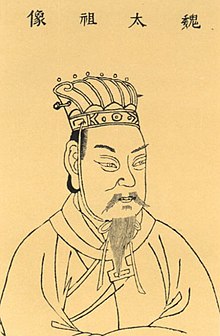
Portrait of Cao Cao, block print c. 1607, Ming Dynasty
Live
Early career
Cao Cao was born in Qiao County (譙, present-day Yongcheng, Henan) during the reign of Emperor Huan of Han. His father Cao Song was the adopted son of the eunuch Cao Teng, who enjoyed the emperor's favor. The biography of Cao Man (part of the Chronicles of the Three Kingdoms) reports that his father's name was originally Xiahou. Cao Cao traced his ancestry to Cao Can, a retainer of the first Han emperor, Han Gaozu. In 2012, scientists examined the chromosomes of descendants of the two and found differences proving that there was no relationship between Cao Can and Cao Cao. Numerous traditions from Cao Cao's childhood deal with his ambitions, his abilities, and his friendship with Yuan Shao. Except for the latter, however, little of it is historically tenable.
At the age of twenty, Cao Cao was appointed district governor of the capital Luoyang. His strict administration did not stop even respected personalities. The eunuch faction around Emperor Ling was concerned about this, and their headman Jian Shuo was looking for a way to conveniently get rid of Cao Cao: When the latter caught the eunuch's uncle on the street after curfew and whipped him as punishment, Jian Shuo took the incident as an opportunity to promote Cao Cao to a post outside the capital region.
When the Yellow Turbans Uprising broke out in 184, Cao Cao was recalled to the capital and promoted to captain of cavalry (騎都尉). He was given the task of putting down the riots in Yingchuan. His success there earned him the post of governor of the Dong Command.
Alliance against Dong Zhuo
After Emperor Ling's death in the summer of 189, open fighting broke out between the eunuch faction (whose most powerful ally was Empress Mother Dong, Emperor Ling's mother) and the party of Empress Dowager He, whose brother He Jin was commander-in-chief of the imperial army. He conspired with his confidant Yuan Shao against the eunuchs and ordered the deserving general Dong Zhuo to the capital to put pressure on the Empress Mother.
Before Dong Zhuo arrived, however, the eunuchs had murdered He Jin and escaped with the heirs to the throne, Liu Bian and Liu Xie. At the Yangtze River, their escape ended when Dong Zhuo's battle-hardened troops caught up with them. The eunuchs plunged into the river, and Dong Zhuo returned with the heirs to the throne to the capital, where he rose to become the guardian of Emperor Liu Bian.
Since the Yellow Turbans Revolt, provincial governors and imperial generals had been given great powers that made them more or less autonomous from the central government in Luoyang (later moved from Dong Zhuo to Chang'an). Dong Zhuo, who now controlled the emperor, laid claim to rule over all of China. But not only did the governors refuse to relinquish their power, but in the area controlled by Dong Zhuo, the mood among the people and court officials was against him.
After Dong Zhuo deposed the young emperor Liu Bian in 189 in favor of the younger Liu Xie (Emperor Xian) and assassinated him the following year, Yuan Shao decided to wage open war against the usurper. He was able to bring many regional warlords to his side. Among these was Cao Cao, who succeeded his superior Zhang Miao, the governor of Chenliu. During the civil war, the capital Luoyang was devastated, and Dong Zhuo moved the government to Chang'an. There the usurper met his end in 192.
ascension to the throne
After several campaigns against Dong Zhuo's scattered forces, Cao Cao had gained the core of his territory. His cousins Cao Hong and Cao Ren, as well as generals Xiahou Dun, Xiahou Yuan, Yu Jin and Yue Jin, served him as subordinate generals. In 193, Cao Cao and his force attacked Yanzhou Province, which was ruled by Governor Tao Qian. The old governor could not withstand the invasion, and his generals Zhang Liao and Chen Gong arbitrarily handed over the province to the neighboring warlord Lü Bu.
So Cao Cao turned against Lü Bu. The notorious general and warrior had settled on the Yangtze River after the assassination of his adoptive father, Dong Zhuo. Cao Cao did not let him steal the initiative and attacked Lü Bu in his capital Puyang. After a hundred days of siege, hunger forced Lü Bu to abandon his position. He fled to Xiapi, where he drove out the governor Liu Bei and came to an understanding with the warlord Yuan Shu. Later this alliance broke down, and Lü Bu sought the proximity of Cao Cao. The latter, however, was busy ideologically underpinning his rule by taking in the emperor.
Since the death of Dong Zhuo, the young emperor Xian had been in the hands of his successors, the generals Li Jue and Guo Si. They wore each other down in power struggles and in 195 had to allow the emperor to leave Chang'an with his entourage and set off for ruined Luoyang. Once there, the emperor and his entourage had no provisions and were defenseless against enemy attacks. When Cao Cao learned of this, he set out for Luoyang and won the confidence of the imperial generals Dong Cheng and Yang Feng. He came to an agreement with them to jointly direct the emperor. However, after they reached Cao Cao's headquarters in Xuchang, he gave them inferior honorary titles and ousted them. Yang Feng was dissatisfied and rose up against Cao Cao, but was defeated and then forced to flee to Yuan Shu; his subaltern Xu Huang joined Cao Cao. Dong Cheng then withdrew, leaving Cao Cao a free hand. The latter henceforth issued edicts in the name of Emperor Xian.
Union of the North
In the year 197, Cao Cao had made himself subservient to a minor warlord of the south, Zhang Xiu. When Cao Cao visited him at Wan Castle, he took his host's widowed sister-in-law as his concubine. Zhang Xiu was angered and called to arms to kill Cao Cao. The latter's son Cao Ang, nephew Cao Anmin and bodyguard Dian Wei met their deaths in the fighting, Cao Cao escaped. Later, Zhang Xiu finally submitted, thus securing for Cao Cao the city of Wancheng, which guarded the most important pass to the south (Sichuan).
Lü Bu lost to Cao Cao in 198 and was executed, his general Zhang Liao defected to Cao Cao. Now there were only two major power factors in northern China (north of the Yangtze River): Cao Cao and Yuan Shao, who had been governor of Jizhou in Han Fu's place since 191 and had crushed his rival Gongsun Zan in 199. He controlled a prosperous and populous territory and had capable generals and advisers. At least since Cao Cao controlled the emperor, the two were rivals. Yuan Shao had also planned to lead the emperor to his Ye headquarters in 195; however, on the advice of his advisor Chunyu Qiong, he had refrained from doing so and missed a golden opportunity to legitimize his rule in northern China.
To defeat Cao Cao, who had good generals and advisors and powerful troops, Yuan Shao formed an alliance with the neighboring Wuhuan tribes. He then advanced his troops to the Yellow River to meet Cao Cao at Liyang (now a large township in Xun County). After a few small engagements, the Battle of Guandu occurred in the spring of 200, in which Yuan Shao was defeated by Cao Cao despite his superior numbers. His general Zhang He defected to Cao Cao, and Yuan Shao fled across the Yellow River. After another defeat at Cangting in 202, the latter died and left the remains of his empire and army to his eldest son Yuan Tan. The latter, however, quarreled with his youngest brother Yuan Shang over the inheritance. Cao Cao took advantage of the dispute between the two and defeated Yuan Tan in 205, while Yuan Shang fled to the northern part of the Korean peninsula to the warlord Gongsun Kang. The latter came to an understanding with Cao Cao, assassinated the fugitive in 207, and nominally submitted to Cao Cao's suzerainty.
On June 9, 208, Cao Cao had himself appointed chancellor by the emperor. This post was the highest in the court after the emperor himself and had last been held by the usurper Dong Zhuo. This had also been the first time a chancellor had been appointed since the collapse of the Western Han Dynasty.
A dispute had arisen over the northwestern province of Liangzhou at the beginning of the 3rd century. The formerly allied warlords Ma Teng and Han Sui fought bitterly for supremacy. Cao Cao succeeded in reconciling and subduing them. He appointed Ma Teng as governor to Ye, while he appointed Han Sui and Ma Teng's son Ma Chao as governors to Liangzhou.
Battle of Chibi and other campaigns
Cao Cao had consolidated his rule in northern China and was now making preparations to subjugate the remaining areas of the Han Empire. By 207, the following warlords remained in southern China:
- Zhang Lu, a minor warlord, controlled the strategically important city of Hanzhong.
- Liu Zhang, the governor of Yi Province, ruled over a large part of present-day Sichuan.
- Liu Biao, the governor of Jing Province, had ruled his province autonomously during the civil war, but had made no attempt to expand his sphere of power. This made him an easy target for Cao Cao, who defeated him in 207.
- Sun Quan succeeded his elder brother Sun Ce as warlord in southeastern China after the latter's death and controlled what are now Anhui, Jiangxi and Zhejiang provinces. He was the most powerful of the four warlords.
Cao Cao drove the last scattered of his defeated rivals from the north, including Liu Bei, who had served Yuan Shao. The general suffered defeat at the hands of Cao Cao at the Battle of Changban (Summer 208), but escaped south with the help of his allies Zhang Fei and Zhao Yun. There he sought an alliance with Sun Quan, who was preparing for Cao Cao's attack. Exact figures for Cao Cao's forces vary; it is believed to be about 220,000, opposed by about 50,000 men on the side of Sun Quan and Liu Bei.
The three army camps were located on opposite banks of the Yangtze River, at a place known as Chibi (Red Rock). Cao Cao's superior force camped on the north bank of the river, Liu Bei's army and Sun Quan's navy on the south. Since Cao Cao's soldiers were not used to fighting on water, unlike Sun Quan's soldiers, Cao Cao sought to compensate for this disadvantage. He took the advice of a supposed defector from Liu Bei's camp, Pang Tong, to moor his ships. This was to alleviate the rocking on the crossing. However, Cao Cao's fleet was also rendered unable to maneuver by this measure, allowing Sun Quan's general Huang Gai to set it on fire and burn it completely to the ground by taking advantage of the south wind. By this stratagem Cao Cao's superior force was routed at the Battle of Chibi, inflicting a stinging defeat on him. This sealed the division of China into two parts for the next few decades. Sun Quan granted Liu Bei the province of Jingzhou so that he could conquer a power base from there.
After this setback, Cao Cao concentrated on campaigns to secure his empire in the north. There, the governors Han Sui and Ma Chao had dared to revolt in 211 and shake off his suzerainty. Cao Cao had Ma Teng, Ma Chao's father, executed at Ye and began a major campaign to subdue the rebels, who had been joined by the Qiang tribes. From March to September 211, Ma Chao was able to stall Cao Cao's forces until he lost the battle at Tong Gate and fled to Zhang Lu, the governor of Hanzhong.
For four more years, Cao Cao's general Xiahou Yuan fought Han Sui before defeating him and ending the rebellion. In 215, after the final pacification of Liangzhou, Cao Cao made an attack on Hanzhong. Zhang Lu offered little resistance and submitted to Cao Cao after a few weeks. Ma Chao fled south to join Liu Bei.
In 217, Cao Cao's general Zhang Liao repelled an invasion by Sun Quan at the city of Hefei. According to the Chronicles of the Three Kingdoms, Zhang Liao had only 30,000 men facing 100,000 on Sun Quan's side. The victory therefore brought great fame to the general. In the same year, Hanzhong was attacked by Liu Bei. However, he could not break through because Xiahou Yuan stopped him at Yangping Pass. It was only in 219 after his victory in the Battle of Mount Dingjun that Liu Bei succeeded in taking over Hanzhong. Xiahou Yuan fell in the battle.
Cao Cao had thus become vulnerable in the southwest of his empire and sought an alliance with Sun Quan, who reclaimed Jingzhou Province from Liu Bei. There, the famous general Guan Yu had been appointed as governor and had his quarters in Fancheng. The armies of Cao Cao and Sun Quan made two concerted attacks on the headquarters, and in the double battle of Fancheng Cao Cao first lost to Guan Yu, who was then defeated and executed by Sun Quan's general Lü Meng. Liu Bei's loss of Jingzhou Province and his break with Sun Quan gave Cao Cao external security again.
Domestic policy
Cao Cao's domestic policies were shaped by long-term strategic considerations: in order to maintain and possibly expand his territory, he needed a numerous and able-to-defend population in order to be able to raise powerful troops. Under the impression of a famine in 194, he carried out agricultural reforms in his sphere of power. He forcibly settled the small farmers and tenant farmers who had fled their homes during the Civil War in newly created military farmer colonies. Their task was to defend the country, and any surplus production had to be delivered.
In order to optimize the administration of his empire, Cao Cao also undertook reforms of the civil service system. However, he did not succeed in limiting the positions of the important officials to such an extent that a takeover of power remained impossible. Thus, his grandson Cao Rui was also to be the last emperor of the Wei dynasty to rule himself and not be directed by officials and dignitaries.
Cao Cao's religious policy was tolerant. Thus, in addition to the state religion, Confucianism, he also tolerated the scattered Buddhist communities that went back to the Han prince Liu Ying, and the Daoist Heavenly Master movement from Hanzhong, which developed into one of the most important Daoist currents in the following centuries.
Preparation for the takeover
Cao Cao's control over the emperor was complete. He had himself appointed Gong of Wei (魏公, wèi gōng - "roughly: Duke of Wei") in 213 and awarded the Nine Medals of Honor, a sign of his imminent assumption of the throne. He punished assassins and their relatives mercilessly, sometimes unjustly. In 200, for example, along with the conspirators Dong Cheng, Zhong Ji, and Wang Ju, he also executed their families, including the imperial concubine Dong. When Empress Fu Shou complained about Cao Cao's cruelty in a letter to her father and Cao Cao learned of it, he had the empress deposed and executed along with her two sons. The next year, he forced the emperor to elevate his concubine Cao Jie (a daughter of Cao Cao) to empress.
Throughout his life, Cao Cao did not dare to usurp the imperial throne. He did, however, tie in with imperial privileges by being granted the title Wang of Wei (魏王, wèi wáng - "roughly: Prince/Prince of Wei") by the emperor in 216. Since the title was hereditary, he had also established his family's status as leaders in the empire. He died on March 15, 220, in the capital Luoyang, which he had rebuilt and fortified after his victory over Yuan Shao. His son Cao Pi inherited posts and titles and forced the emperor to abdicate in his favor that same year. He thus became the first emperor of the Wei dynasty.
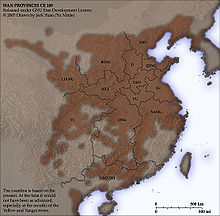
Han dynasty sphere of power at the death of Emperor Ling (189 AD).
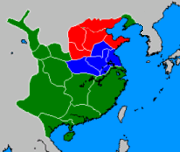
Area of power of Yuan Shao (red) and Cao Cao (blue) on the eve of the Battle of Guandu.
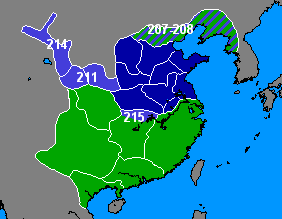
Cao Cao's conquests after the Battle of Guandu.
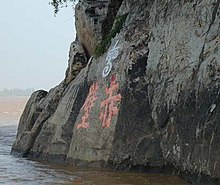
The Red Rock (Chibi) in the Yangtze River.
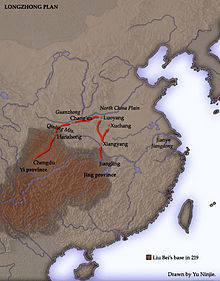
Liu Bei's deployment base in 219. His strategist Zhuge Liang planned a two-pronged attack (red) on Cao Cao's territory.
Tomb
In late December 2009, it was announced that a 740-square-meter underground tomb had been discovered in the village of Gaoxixue in Anyang County, Henan Province, near the ancient Wei capital of Anyang. According to an inscription on a stone tablet, the tomb is that of "King Wu of Wei," as Cao Cao was officially titled. The tomb, which can be reached through a 20-meter-deep and 40-meter-long tunnel - "a complicated construction," according to excavation director Pan Weibin - houses the remains of three corpses - those of a man aged about 60 and those of two women aged about 50 and between 20 and 25 - in addition to hundreds of archaeological findings. According to the accompanying inscriptions on stone tablets referring to "King (Wang) Wu of Wei" (魏武帝), the man is Cao Cao. The female corpses are said to be Cao Cao's wife and concubine. According to historical reports, Cao Cao's wife died at the age of 70 to 80 years, but this does not correspond with what was found.
It is believed that Cao Cao decreed during his lifetime to be buried only in an inconspicuous modest tomb so as not to attract grave robbers. His son Cao Pi, however, did not adhere to this order, but built a huge underground tomb with an above-ground temple. Later, however, he had second thoughts and had the above-ground part of the tomb removed and the rubble cleared away to respect his father's wishes. This would explain why only the hidden underground part of the tomb still existed.
A total of around 250 artefacts were found, including gold, silver, ceramics, paintings, a sword and scabbard, and 59 stone tablets with details of the individual grave goods.
Questions and Answers
Q: Who was Cao Cao?
A: Cao Cao was a Chinese general who lived from 155-220.
Q: What did he do in 184?
A: In 184, Cao Cao gathered an army to fight against the Yellow Scarves rebellion.
Q: How did he gain control of Emperor Xian?
A: After Dong Zhuo had seized Emperor Liu Bian and deposed him in favour of his brother Liu Xie (Emperor Xian), a coalition of local warlords all over the country arose against Dong. It was called by Cao Cao and led by Yuan Shao, and many powerful warriors joined it. After Dong Zhuo's death through the hands of his foster son Lü Bu, Emperor Xian was controlled by Dong's associates. He fled to Chang'an (the old capital) in 195 but almost starved to death. Cao Cao saved him in 196 and brought him to his own place at Xuchang, thus gaining control of Emperor Xian.
Q: How successful were his campaigns against the south?
A: His campaigns against the south were not very successful; he managed to get famous general Guan Yu killed by Sun Quan's general Lü Meng, but ultimately failed to conquer the south due to opposition from Liu Bei and Sun Quan who defeated his forces in the Battle at Red Cliffs.
Q: When did he die?
A: He died in 220.
Q: Who succeeded him after his death?
A: His son,Cao Pi succeeded him after his death and eventually deposed Emperor Xian that same year becoming Emperor Wen of Wei while making his father posthumously Emperor Wu of Wei.
Search within the encyclopedia